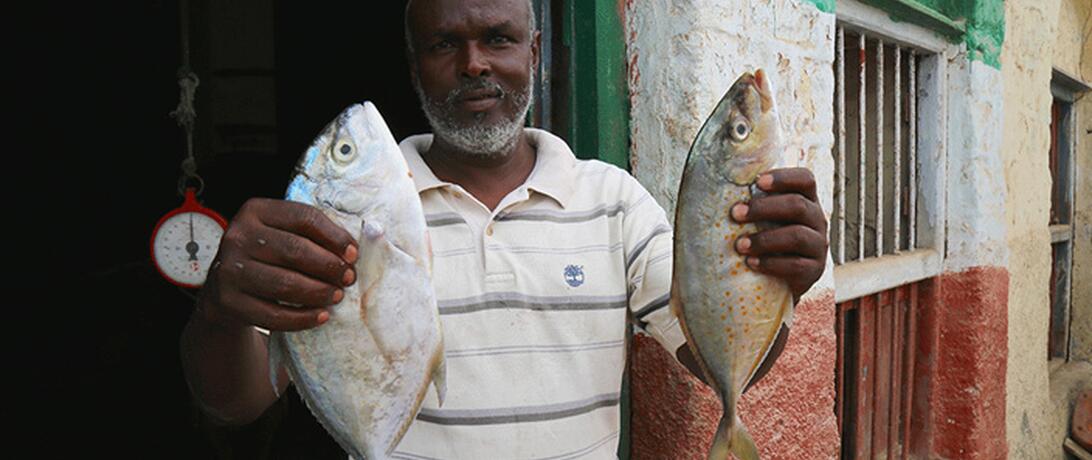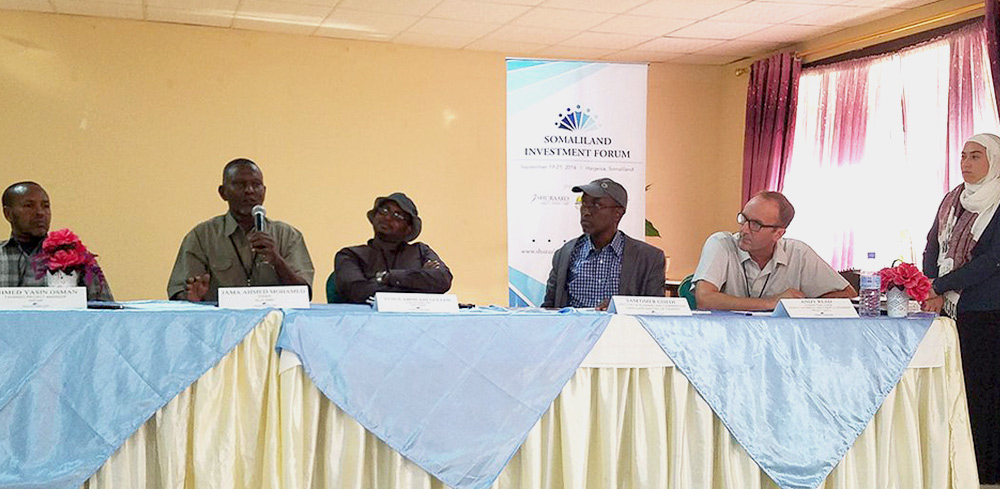
As part of our sister program Shuraako’s Somaliland Investment Forum, I facilitated a discussion on challenges and solutions for fisheries in Somaliland.
In the face of significant development challenges, Somaliland has been making great strides to stabilize and expand its economy. In an effort to encourage this growth, Secure Fisheries’ sister program, Shuraako, hosted the Somaliland Investment Forum in Hargeisa, September 19-20, 2016. The forum brought together local business owners, investors, government officials, international aid agencies, and civil society actors for discussions and workshops on how they can collaborate to build the Somaliland economy and encourage investment to productive economic sectors, including the fishing sector.
As part of the forum, I facilitated a panel discussion titled “Current Challenges and Future Solutions for Fisheries in Somaliland.” The panel consisted of a variety of stakeholders in the fishing community, including fishers, a Somaliland Ministry of Fisheries and Marine Resources representative, and international development representatives. Each had a slightly different perspective on what the biggest challenges are and how Somalilanders, their government, and the international community can work together to solve them. However, one main message came through: there is ample opportunity to grow the fishing sector in Somaliland, but it is crucial to maintain a long-term focus on economic and environmental sustainability.

Paige Roberts facilitates fisheries discussion at Somaliland Investment Forum. - Photo by Jean-Pierre Larroque, OEF
Artisanal fishers in Somaliland are spread along the Gulf of Aden coast in ten settlements. Fishing is generally conducted from small boats and catch consists of reef-associated species (emperor, grouper, snapper, etc.), tuna, and mackerel. The sector is small compared to other fishing nations, but it holds great potential to ensure food and economic security for these coastal communities, if it can be sustainably developed.
The fishers and fishing industry representatives on the panel all pointed to the same core challenges: the lack of modern and efficient fishing gear and fish-finding technology, ice makers, cold storage facilities, and other civil infrastructure. Many of the fishing villages are in remote locations with only dirt roads for access. As a result, fishing equipment is difficult to procure and fishers lack the telecommunication infrastructure that would help them learn about modern technology, what is available, and how to use it.
The fishers and government official on the panel emphasized the need for developing fishers’ skills and understanding of the available resources in addition to upgrading equipment. Yusuf Gulled, the Director of Fair Fishing, a cooperative that supports fishers in Berbera, reminded us of the old adage, “If you give a man a fish, he eats for a day. If you teach a man to fish, he eats for a lifetime.” Though often used as a metaphor, in Somaliland, it is literal. There is both a need and a desire to expand fishing knowledge. Importantly, trainings must be designed for the long term. An aid organization installing an ice making facility in a coastal town is an excellent first step, but if it breaks and no one in the community is trained to fix it, it becomes useless. Along the same lines, if no one is trained in hygienic processing and storage of caught fish, the facility and the catch are wasted.
The international community is attempting to fill this knowledge gap. Also on the panel was Ahmed Yasin Osman, the head of operations for Oxfam in the region. He discussed their European Union-funded program to create a quality system called Fish Inspection, Quality Assurance and Export Certification. The system created quality control standards, provided equipment, and trained Ministry employees and industry workers in hygienic fish processing and fisheries management guidelines. They looked to the eastern African region and, finding good examples of quality control in Uganda, held a training there for Somaliland processors and Ministry workers. This is a great example of how aid organizations can facilitate cooperation between the local fishing industry and government institutions, while fostering collaboration across country borders to build strong relationships among fishing communities and to increase fishing and processing capacity.
Projects like those of Fair Fishing and Oxfam are moving Somaliland fisheries toward their sustainable development goals outlined by the Somaliland government in the National Development Plan 2012-2016. Sam Omer Ghedi, Director of Planning and Coordination for the Ministry of Fisheries and Marine Resources, discussed these goals in his presentation on the panel, but he also cited another major impediment: lack of market access. According to Ghedi, there is unmet demand for fish in cities, both coastal and inland, and an even larger untapped export market to nearby countries such as Ethiopia, Djibouti, and Yemen. The inability to supply even domestic markets is a result of the low fishing capacity combined with a lack of refrigerated trucks or boats for transporting frozen fish. Ghedi sees this as one major opportunity for investment that would boost the economic viability of fishing ventures. He stressed, however, that there is a great need for fish stock assessments and a sustainable management plan in order to secure the future of the Somaliland fishing industry.
All the panelists recognized that each actor has a role to play in developing the fishing sector in Somaliland. While significant challenges remain, there is an atmosphere of cooperation and positivity surrounding the many opportunities that exist there. Maintaining a focus on the long-term sustainability of the sector will be crucial. If new projects follow the models of the ongoing ones and address current challenges with solutions that have longevity, the prolific future of Somaliland fisheries will be assured.
Article Details
Published
Topic
Program
Content Type
Opinion & Insights